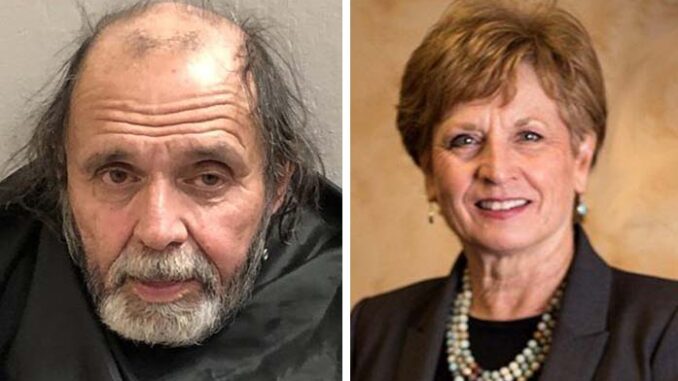
A retired Cochise County judge who approved a search warrant last year in a drug investigation has been subpoenaed to testify Wednesday about whether jurors will ever hear about most of the evidence compiled in the case.
Laura Cardinal, who retired from the Cochise County Superior Court in December 2022, will be called as a witness in the case of State v. Robert Allen Brown. Public records show Brown, 64, was indicted in February for six felonies related to the sale and distribution of methamphetamine.
Three of the charges are Class 2 felonies which can carry especially long sentences. Brown is out of custody awaiting trial later this year, but first Judge Jason Lindstrom has to decide what evidence any jury will hear.
And must of the decision could hinge on a search warrant Cardinal authorized on Dec. 29, 2022, as one of her last acts on the bench.
Cardinal has been subpoenaed by Deputy County Attorney Kristina Guerrero. The rare move comes in response to efforts by Chris Kimminau, Brown’s court-appointed attorney, to suppress evidence obtained through search warrants issued during the course of a U.S. Drug Enforcement Administration (DEA) investigation into meth sales in Cochise County.
According to the case file, Brown was taken into custody Jan. 23 after a traffic stop near his residence in Benson. But prior to his arrest, two search warrants were approved at the request of a DEA special agent assigned to the Sierra Vista Resident Office and the Southeast Arizona Major Investigations Team (SAMIT).
The search warrant issued by Cardinal required a cellular carrier to secretly activate a GEO Locate PING for a cellphone number a “reliable confidential source” told the DEA that Brown used. The source also said Brown was traveling from Cochise County to Tucson to purchase meth he then sold.
The second search warrant was issued by a different judge five days later. It allowed for a GPS tracking device to be installed on a Toyota truck registered to Brown.
Then after the Jan. 23 traffic stop, a third search warrant was obtained by the DEA special agent. It authorized a search of Brown’s residence, any vehicles at that property, and “any individuals” there at the time the search warrant was executed.
A fourth search warrant authorized a week after Brown’s arrest permitted investigators to forensically examine four cellphones seized from his residence.
But for Brown’s attorney, the entirety of the evidence seized under authority of those search warrants should be suppressed and never presented at trial to a Cochise County jury.
According to Kimminau, there was insufficient probable cause presented to Cardinal back in December 2022 to justify the first search warrant that allowed Brown’s cellphone to be tracked.
Then that phone location data was improperly relied on by the DEA to justify a GPS tracking device on Brown’s Toyota truck, according to the defense motion to suppress. All of which eventually led to the search of his residence.
It is Kimminau’s burden to show one or more of the search warrants were not lawfully authorized and/or executed. Guerrero will question Cardinal under oath during the Aug. 23 hearing to refute any suggestion that the Dec. 29 search warrant was improperly issued.
Court records show the DEA special agent began receiving location updates about Brown’s phone on Dec. 29 shortly after his cellular provider was served with Cardinal’s search warrant. The updates continued every 10 minutes for days.
Then on Jan. 3, a Sierra Vista Police Department narcotics K9 “positively alerted” to Brown’s truck in a public parking lot. The same date, the second search warrant was approved by Judge Timothy Dickerson for the installation of a GPS Tracking Device on Brown’s Toyota truck based in part on the phone location data and the K9 alert.
Brown’s court file then jumps to shortly before 3 p.m. on Jan. 23. That is when the monitoring of Brown’s cellular device showed the device was leaving the Benson area and traveling west toward Tucson, according to the DEA special agent.
By further analyzing the GPS Ping data, investigators were able later that day to pinpoint the phone’s location as being inside a Nissan Pathfinder registered to someone else’s name but sharing Brown’s address.
By then, the Nissan and the phone were traveling east on Interstate 10, back toward Benson. When the vehicle exited the highway, a traffic stop was conducted by a municipal police officer due to reported “multiple driving violations.”
Brown was identified as the driver and there was one passenger with him. A police K9 once again alerted to the vehicle, the special agent noted.
“During the subsequent probable cause search of the vehicle, your Affiant located a plastic container inside the 2000 Nissan Pathfinder,” he wrote in an affidavit for the third search warrant, which involved Brown’s residence and vehicles. “Inside the plastic container, your Affiant located approximately one half to full pound of suspected methamphetamine.”
Such a quantity, the special agent noted, is considered a “for sale” amount.
Various evidence suggesting Brown was involved in the distribution or sale of meth was seized during the Jan. 23, according to court records. Four cell phones were included in the seizure.
On Jan. 31, yet another Cochise County judge issued a search warrant. This one allowed for the forensic examination of the phones.
In support of that search warrant, another DEA special agent attested that the phones likely contained text messages discussing illegal drug transactions, “as well as other intelligence that will aid in furthering this investigation.”
A trial date will be announced once Lindstrom rules on the search warrant dispute.


